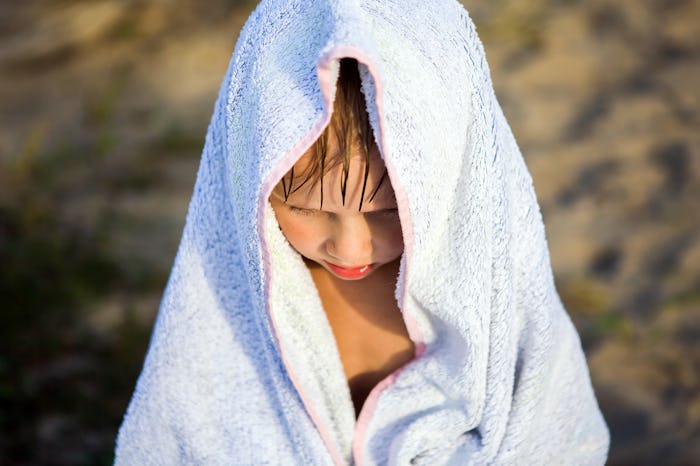Life

If Your Kid Doesn't Want You To See Them Naked, Here's What Experts Say To Do
No matter how much I try to emphasize body positivity and normalize the human form, my oldest son is prone to embarrassment about his body. He has gone through phases where he shies away from me if I try to help him take a bath or change clothes. Apparently, I'm not alone in this. I spoke to several experts who explained that this can be a normal progression of modesty, as well as what to do if your kid doesn't want you to see them naked.
Now that my son is nearly 7, doing these things by himself is not a big deal anymore, but for several years where he still needed help, we definitely struggled. Melissa O’Connell Liggett, Ph.D. developmental psychologist with the Child Development Program at Children's National Health System, tells Romper that what I experienced with my son is typical. "The age at which children develop a sense of modesty varies, but most children by 5 years of age will begin to feel a need for privacy," she says. "It may be as subtle as covering themselves with their hands when naked or overt as refusing to allow others see them naked, but by the early elementary school years, it is not uncommon for children to express this need."
Other factors that could contribute to a child's desire for privacy when nude include seeing separate bathrooms and locker rooms at school for boys and girls, a more developed understanding of your family's cultural values, or even a reaction to your own comments about your body, according to Dr. Gene Beresin, executive director of the Clay Center for Young Healthy Minds. "Remember that all kids are different, just as adults are different. Some care less about being seen unclothed or partially unclothed, and some care a lot," Dr. Beresin tells Romper. "We all have different levels of anxiety about many things, including being seen. People, young and old, are more or less sensitive to perceived judgment or criticism. It’s really important to know your child and their level of comfort or discomfort with their bodies being viewed."
Dr. Liggett notes that children as young as 3 can begin to experience these feelings as they explore their own bodily autonomy and independence, as well as understand parents' references to "private areas" and reminders of appropriate situations for removing clothing. She explains that it is important to respect a child's request for privacy. "Allowing them space to get dressed or bathe, with appropriate supervision depending upon the child’s age, will help them build their sense of independence. At home, that may mean space in their bedroom or bathroom, but when out, such as at a public pool or locker room, that may mean changing in a private stall rather than in the open," Dr. Liggett says. "Let the child know that you understand their need for privacy, but are there to offer assistance if they get stuck or need it."
Dr. Beresin recommends talking to your child about their desires when it comes to helping them when they may be without clothing. "It’s always helpful to talk with them about how they feel about their body, their physical appearance and their desires for being taken care of without clothes," he says. "Ask open ended questions, so you know what your child’s feelings are, especially about being ashamed or embarrassed. Come up with common solutions to situations in which they may be seen without clothing."
Some of Dr. Beresin's suggestions include using a robe or draping a towel around them after bath time, letting your child pick which parent they are most comfortable assisting them, or hanging a "knock before entering" sign on their room if it will help them feel more comfortable, or simply shielding your eyes or looking away as you help them dress. And if you're pressed for time, such as when getting ready for school in the mornings, Dr. Beresin recommends allowing kids the opportunity to dress themselves, but to gently set a time limit if you need to. "This may be stressful but they may be able to find their own way of coping and keeping to a schedule. This is perhaps an example of 'tough love' but should always be followed up at a later time when sensitivity about nudity can be gently and sensitively discussed," he says.
Additionally, Dr. Liggett suggests pulling the shower curtain partly closed to give some privacy during bath time, noting that safety should be a parent's number one priority if children are young enough to still need assistance. "Being physically present for safety at younger ages is important, but a parent can engage in a quiet activity, such as reading a book, to take direct attention away from the child taking a bath or getting dressed," Dr. Liggett says.
This article was originally published on